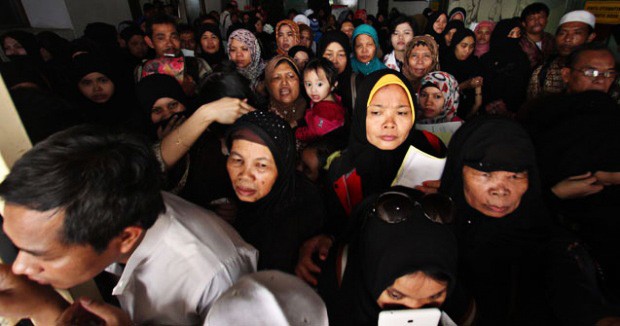Asean struggles to protect laborers
Change Size
 Indonesian migrant workers in Saudi Arabia queue for an immigration check in their way to go home. (Tempo/-)
Indonesian migrant workers in Saudi Arabia queue for an immigration check in their way to go home. (Tempo/-)
Focus on Asean's skilled migrants excludes the most vulnerable group.
The Asean Community, which took effect at the end of last year, has expressed concern about the movement of skilled workers around the region.
But its interest in the unskilled labour remains poor, despite the fact that this group provides the real workforce that dominates labour flows around the region.
In 2007, Asean agreed to the Cebu Declaration, an agreement on the Protection and Promotion of Migrant Workers as a fundamental instrument to deal with such workers from other areas and nations.
In 2009, the widely-known Asean Mutual Recognition Arrangements (MRAs) were introduced, in line with the Asean Economic Community, to facilitate free movement of eight occupations for the setting up of mutual standards accepted by all Asean member states.
The MRAs were designed to serve mainly labour with acceptably high skills, considered a minority in the Asean labour market.
The Asean Secretariat admitted that the majority of workers in the region were people with a medium or lower level of skills in the informal sector.
A 2014 study by the International Labour Organisation and the Asian Development Bank found that the MRAs actually helped just 1 per cent of Asean workers.
International Organisation for Migration (IOM) regional director Nenette Motus said one of the main challenges was the lack of protection and social security. Many low-skilled labourers, especially those in "irregular situations", were excluded from social security systems, she said.
One reason, she explained, was their position in the informal sector, which blocked workers access to social protection provided by their home or destination countries.
They also tended to have limited access to healthcare and referral services, including psychosocial support, she said.
Low-skilled workers also tended to be more vulnerable to ill-health and preventable physical injuries, she said. Many may not have had pre-departure orientation sessions, especially advice on occupational health and safety.
For special concerns regarding women migrants, she said that many were concentrated in domestic work, an area not acknowledged as a work sector and thus not fully protected as a form of labour.
"This could potentially increase the domestic migrant workers' vulnerability to exploitation, abuse and human trafficking," she said.
Another challenge is irregular migration between neighbouring countries in the Asean region, she said, noting that regular migration processes in receiving countries were very costly and applicants had to wait to go through. So, there were considerable numbers of employers in receiving countries willing to hire people irregularly, and pay even lower wages.
Although the Cebu Declaration has existed for more than 10 years, Asean member countries still cannot agree on a concrete instrument to protect migrant workers' rights.
"Coherent and consistent policy on migrants remains a challenge," Motus said, "and thus contributes to the vulnerability of migrants and the difficulty in regularising their status."
Thailand, home to millions of migrant workers from around the region, has raised concern about security matters, although it accepts that they are needed for economic development.
"We tend to think of the economy when it comes to labour issues," an official at the Labour Ministry said "but some may seem to forget that it is also largely about national security."
While many are designed to facilitate labour with skills, the official revealed that his office has not considered those with lower skills.
"We're not welcoming alien low-skilled labour, but we need to rely on them," he admitted, reasoning that Thailand's birth-rate has been declining and Thai citizens, overall, are getting better educated. Those trends have reduced a number of Thai in low-skilled occupations in the market, he said.
The Labour Ministry has pushed a decree on alien labour management in the country but it is still being considered by the Council of State.
The decree was designed in a bid to draw stricter lines on workers. For instance, it will stipulate that all incoming foreign workers must be approved by responsible registrars before they are able to work in the Kingdom.
Future legislation will also adopt stricter legal measures in a bid to force employers and recruitment agencies to register all foreign employees, he said.
He said the decree, while it sounds not very different from current laws, would help protect "alien" (foreign) low-skilled workers, who usually have less protection compared to people deemed to have skills, with effectively.
For Thailand to achieve greater labor management, the official said it could not be denied that the country would eventually have to look to have a more skilled workforce.






